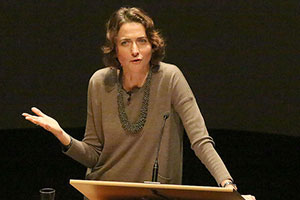
Professor Pamela Cox.
Two new services designed to cut the number of children being removed into care do work – saving money and transforming lives. This is the conclusion of an interdisciplinary team from the University of Essex, led by Professor Pamela Cox from the Department of Sociology. They have just completed the first academic evaluation of two Suffolk based services that support women who have had one or more children removed from their care.
The new services are Positive Choices, run by Suffolk County Council and Mpower, run by children’s charity Ormiston Families. Both aim to provide one to one support for women who have just undergone the harrowing experience of having a child taken into care and, crucially, are at risk of repeating the cycle by becoming pregnant again when they are still facing the same underlying problems.
Throughout the period of the University of Essex evaluation, none of the women who engaged with the services experienced an unplanned pregnancy. Based on national trends, without services such as these, researchers estimate that at least 15% of those women would be likely to do so at some point in the future, leaving them subject to recurrent care proceedings. In addition, an in-depth case study of five of the clients indicated that three showed significant improvement in their emotional health and well-being after nine to twelve months of working with the services. The evaluation team also estimate that the two services combined have saved between at least £500,000 and £900,000 in avoided care proceedings in their first 18 months.
Speaking about the evaluation, Professor Cox, explained, “This is a clear demonstration for policy makers about the potential differences services like this can make. These mothers have invariably had very difficult childhoods themselves. This is one of the reasons why they find it hard to parent successfully. Prior to the establishment of services such as Mpower, Positive Choices and Pause in the London Borough of Hackney, once they had had a child removed, there would be no one to care for them – as the individual, as the woman, left behind. They tended to `fall between’ other authorities and agencies with their complex needs often being recognised but very rarely met. This meant they were at risk of repeating the cycle.”
At present, a very significant proportion of the 70,000 ‘looked after children’ in England and Wales are (half) siblings who have been serially removed from the same birth mother. The only national-level study of ‘recurrent care proceedings’ showed that 29% of all care proceedings in England, from 2007-13, were linked to mothers who had been involved in repeat cases. A local study by the South Suffolk Pre-Birth Working Group in 2011 found that of the 27 babies born in a ten month period in just one maternity unit, and made subject to Interim Care Orders, 23 had older siblings who had already been removed to permanent adoption. One was the eighth child to be removed in this way from the same mother. This study concluded that these women were ‘nobody’s clients’.
Through the new services, women are assigned a project or key worker. That worker then offers a pragmatic, client-led approach, based on one to one support, self-care and trust building. The support is designed to be flexible and to help the woman achieve personal goals and to make informed choices about issues such as contraception.
Both the services and the Essex evaluation will be discussed by academics, practitioners and policy makers at an event at the University of Essex on Tuesday 30 June 2015. Alongside Professor Cox, the Essex evaluation team were Dr Frances Blumenfeld, Dr Danny Taggart, Dr Caroline Barratt, Dr Jackie Turton and Ms Zara Rahemtulla.
* Hear a BBC Essex interview with Professor Cox in which she disucsses the evaluation and the servies provided (1 hour 10 minutes in)